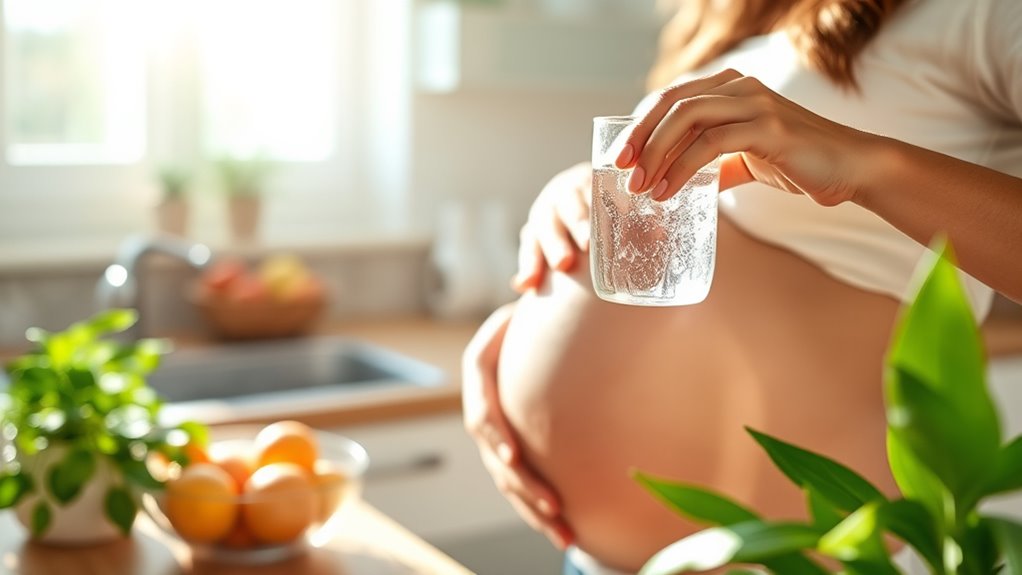Staying hydrated while pregnant is vital for your health and your baby’s growth. Aim for about 10 cups of fluids daily, mostly from water, milk, and juice. Eating hydrating foods like fruits and vegetables can help too. Watch for signs of dehydration, like dizziness or dark urine. Carry a water bottle and drink regularly. Limiting caffeinated and sugary drinks supports your hydration goals. There’s so much more to discover about hydration benefits during pregnancy that you won’t want to miss.
Key Takeaways
- Drink about 2.3 liters (10 cups) of fluids daily to support maternal health and fetal development.
- Include hydrating foods like fruits and vegetables to boost fluid intake.
- Monitor hydration status by paying attention to thirst and urine color.
- Carry a reusable water bottle to encourage regular water consumption throughout the day.
- Limit caffeinated and sugary beverages to avoid dehydration risks during pregnancy.

When you’re pregnant, staying hydrated isn’t just important; it’s essential for both your health and your baby’s development. Proper hydration supports fetal growth by forming amniotic fluid and maintaining your blood volume. It’s crucial for transporting nutrients to your baby through the placenta, ensuring they receive everything they need to thrive. Plus, it helps regulate your body temperature, reducing the risk of heat-related complications during those hot summer days.
You might notice that hydration eases common pregnancy discomforts like swelling and morning sickness. By drinking enough fluids, you can combat issues like constipation and hemorrhoids, promoting regular bowel movements. Staying hydrated also supports healthy blood circulation, which is vital in reducing the risks of preeclampsia, a serious condition that can affect pregnant women. You’ll find that drinking enough fluids can improve your overall comfort, reducing symptoms like dizziness. Additionally, maintaining a proper level of hydration status can be monitored through your thirst and urine color.
The Mayo Clinic recommends that pregnant women consume about 2.3 liters or 10 cups of fluids each day. If you’re active or it’s particularly hot outside, you may need to increase your intake even more. Fluid sources can include water, milk, juice, and hydrating foods like fruits and vegetables. While the recommended fluid intake generally doesn’t vary by trimester, your needs may increase as pregnancy progresses.
However, staying hydrated can be challenging. Women often find it difficult to meet their increased water needs, particularly in the second and third trimesters. If you’re overweight or obese, you might face a higher risk of underhydration. Physical activity can also increase your body’s water output, so it’s crucial to replace lost fluids regularly. You might consider using digital tools or apps to help track your hydration levels and remind you when it’s time to drink.
Incorporating hydrating foods into your diet can also help meet your needs. Watermelon, cucumbers, strawberries, and yogurt are all excellent choices. These foods not only contribute to your daily fluid intake but also support overall health.
On the other hand, dehydration can lead to serious complications like preterm contractions and low amniotic fluid levels. It can affect your baby’s growth and even increase the risk of pregnancy-related issues.
To stay on top of your hydration, drink water regularly throughout the day. Carrying a reusable water bottle can encourage you to take frequent sips, and infusing your water with fruits can make it more enjoyable. By limiting caffeinated and sugary beverages, you’ll be taking important steps to prevent dehydration. Remember, staying hydrated is key to a healthier pregnancy for both you and your baby.
Frequently Asked Questions
How Can I Tell if I’m Drinking Enough Water?
You can tell if you’re drinking enough water by checking your urine color; pale yellow or clear means you’re well-hydrated.
Pay attention to your skin; if it snaps back quickly when pinched, that’s a good sign.
Consistent energy levels and regular bowel movements indicate proper hydration too.
If you notice dry mouth or dark urine, it’s time to drink more.
Regularly sipping water throughout the day can help you stay on track.
Can I Drink Herbal Teas While Pregnant?
Imagine sipping a cup of herbal tea, feeling like a zen master in a serene garden, when suddenly, you remember you’re pregnant.
Can you drink herbal teas? Sure, but choose wisely! Ginger and peppermint are your friends, while parsley and sage might turn your zen moment into a nightmare.
Always keep moderation in mind, and chat with your healthcare provider. After all, you want to sip peacefully, not cause a ruckus!
What Are Signs of Dehydration During Pregnancy?
When you’re dehydrated, you might experience thirstiness, a dry mouth, or headaches.
Fatigue and dizziness can hit you hard too.
Physiologically, watch for dark, odorous urine and low urine output.
Muscle cramps and constipation may also occur, along with a high heart rate.
Staying alert to these signs can help you address dehydration quickly, ensuring you maintain your overall health and well-being.
Don’t ignore these warning signals!
Are Sports Drinks Safe for Pregnant Women?
Sports drinks aren’t generally safe for you during pregnancy unless you’re engaging in intense physical activity.
They often contain high sugar levels and stimulants that can be harmful. It’s usually best to stick to water for hydration, as it meets your needs effectively.
If you find yourself sweating excessively, consult your healthcare provider before considering sports drinks.
Focus on maintaining a balanced diet and staying hydrated with water-rich foods instead.
How Does Hydration Affect Labor and Delivery?
Imagine your body as a vibrant garden; hydration is the sunlight that helps it bloom.
During labor, staying hydrated can significantly impact your experience. It can shorten your labor by reducing the duration of active stages, making the process smoother.
Conversely, dehydration might prolong labor and increase the risk of complications.
Conclusion
Staying hydrated during pregnancy isn’t just a trendy hashtag; it’s essential for your health and your baby’s development. By sipping water throughout the day and adding a splash of flavor with fruits, you’ll keep your energy up and your body happy. So grab that water bottle like it’s the latest smartphone, and make hydration a priority. Remember, you’re not just fueling yourself; you’re nurturing a tiny human too. Cheers to a healthy pregnancy!









